
 About JCP
Get Involved
Community Resources
Community News
FAQ
Contact Us
About JCP
Get Involved
Community Resources
Community News
FAQ
Contact Us

|
 |
Java Community Process: Executive Committee Elections Nominees for 2019

|
The 2019 Fall Executive Committee Elections have started. This year, there are 5 Ratified, 2 Elected and 2 Associate Seats open for election.
We hosted the Meet the JCP EC Candidates conference call on Thursday, 24 October at 10 AM PDT.
The recording is available on the JCP Multimedia page.
Please refer to the Java Community Process EC Elections page for more information on the Executive Committee Elections.
Please refer to the Executive Committee Information page for more information on the current Executive Committee.
What follows are the qualification statements provided by the candidates for the Executive Committee, along with a
brief biography of the person who would serve as the Member's representative on the Executive Committee if elected,
and a position statement when one was provided.
| 2019 EXECUTIVE COMMITTEE RATIFIED SEAT CANDIDATES |
Arm
|
Arm with its partners are, like Java, present everywhere from embedded devices to cloud servers. Therefore we see the
Java Platform as vitally important to our customer's success and consequently regard membership of the JCP important for
ensuring that Java continues to work well on Arm platforms.
|
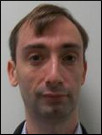
Stuart Monteith
|
Stuart Monteith is a principal software engineer in the Open-Source Software group at Arm in Cambridge, UK. There he has
worked on virtual machines, most recently OpenJDK, often under the auspices of Linaro. Prior to this he worked in IBM
with the JVM on various Linux platforms and other projects such as JSR-326. He has worked with Java since 1996 during
his degree course at the University of Strathclyde.
|
| | |
Fujitsu
|
Fujitsu has a long history of implementing Java technologies, going back to 1996. Fujitsu has implemented Java across
what is the broadest range of platforms. Fujitsu provides the Java EE certified Interstage Application Server.
Fujitsu has been a member of the JCP/Executive Committee since its inception and participated in and/or supported
over fifty JSRs. Fujitsu hosted the JCP EC F2F meeting in 2019 in Japan. At Code One 2019 Fujitsu got JCP Award
for "Long Standing EC Member".
After moving Java EE to Eclipse Foundation, Fujitsu makes a great effort to build Java eco systems in Jakarta EE
working group.
|

Kenji Kazumura
|
Kenji Kazumura is working for Fujitsu Limited as a Java Architect, and also is in charge of developing Interstage
which is Java EE certified application server. He has optimized the several huge enterprise Java applications,
specifically in the field of mobile communication and financial service, in order to run with high performance
and reliability. He has participated in the Expert Group of JSR 204 and 382, and is now working to make the
cloud and micro services environment be more useful by accelerating Java technology into this area.
|
| | |
IBM
|
IBM and Red Hat have been innovators, implementers, and users of Java for over 20 years, and rely upon the standards
set by the JCP to build integrated hardware and software solutions stacks. We see open governance and standards as
key components to the success of the Java ecosystem going forward, and bring a significant technical and business
perspective to the JCP discussions.
IBM Position Statement (.pdf file)
|

Mark Little
|
Mark has been heavily involved in standards efforts such as the OMG where he was a collaborator on the Object
Transaction Service specifications and chair of the Additional Structuring Mechanisms for the OTS. In OASIS
he worked on the BTP specification and was also involved with WS-CAF, WS-TX, WS-RX and others, working closely
with colleagues from Microsoft, IBM, etc. He was involved with the W3C WS-Addressing working group since it
started as well as the WS-Policy and WS-CDL committees.
|
| | |
Intel
|
A significant population of developers and end-users run Java on Intel architecture platforms, providing Intel with
unique perspectives on the Java platform, that of software and hardware working together to move Java forward.
Intel has actively contributed to the JCP since 2002, participated in more than 20 JSRs, worked with major JVM vendors
on Java optimizations, published many research papers and participated in major conferences, including CodeOne 2019.
Intel is actively contributing to a number of forward looking OpenJDK efforts such as the Panama project.
Intel Position Statement (.pdf file)
|

Steve Dohrmann
|
Steve Dohrmann is a Senior Staff Software Engineer at Intel. He has worked on various Java projects over the
past 20 years, and is passionate about Java and its future. His Java development work includes the Java Media
Framework, mobile agent software, secure collaboration software, a cryptography framework, embedded parallel
programming for Java, and enabling Java to use persistent memory.
|
| | |
Sociedade de Usuários da Tecnologia Java - SouJava
|
SouJava (the "Java Users Society") is an established non-profit organization and Java User Group focused on strengthening
the Brazilian Java developer community. Founded in 1998 and based in São Paulo, SouJava congregates over 40 thousand
members throughout the country. SouJava was the first JUG to join the JCP and has been active in the Process for almost
a decade. During this time, the group had an important role on the open source of Java, to the point that Dr. Dobbs Magazine
considered at the time Brazil as the reason for the release of OpenJDK. For the last two years, SouJava has used its role
in the JCP EC to improve the participation of JUGs, individuals and small companies into shaping the future of Java by
participating strongly on the Adopt-a-JSR program, with 80+ of the groups members involved in promoting and adopting JSRs
and also leading the discussions that propose to increase membership and participation from individuals and non-profits
into the JCP.
SouJava considers the JCP a fundamental part of the Java ecosystem. The long-term success of Java depends on a process
that encourages vendors, developers and users to contribute and innovate, and that gives everyone the necessary rights
to implement the results. SouJava is committed to ensuring that the JCP is balanced and transparent, and that there is
an equal standing among JCP members. As an active participant in open-source efforts, the group intends to help ensure
that FOSS projects and implementations of Java standards are able to both bring contributions, and also to share process
results. As a leading member of the worldwide Java Users Group Community, SouJava is committed to defend and promote
JUG participation at the JCP.
For the last two years, as member of the JCP EC, SouJava has strived to bring its passion for community, JUGs, open source,
standards, and Java to the JCP, and thus foster transparency and participation. After two years of strong involvement,
we look forward to increase even more our relationship with the Java community, and we appreciate your support so we can
continue to work towards a better JCP.
|
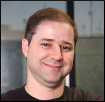
Bruno Souza
|
Bruno Souza is a Java Developer and Open Source Evangelist. As founder and coordinator of SouJava
(Sociedade de Usuários da Tecnologia Java; Java Technology Users Society) and leader of the Worldwide Java User Groups
Community at Java.net, Bruno helped in the creation and organization of hundreds of JUGs worldwide. For the past 2 years,
Bruno has represented SouJava on the JCP EC, where he has defended transparency and participation as means to improve the process.
A Java Developer since the earliest days of the technology, Bruno took part in some of the largest Java projects in Brazil.
Bruno is a Principal Consultant at Summa Technologies, and has extensive experience in large projects in the Government,
finance and service industries. A Cloud Expert at ToolsCloud, he promotes and develops cloud-based systems using Java. Nurturing
developer communities is a personal passion, and Bruno works actively with Java open source communities and projects.
Bruno Souza is a Director of the Open Source Initiative (OSI), President of the innovation-focused Campus Party Institute,
and Coordinator of Nuvem, the Cloud Computing Lab of LSI/USP. When not in a computer, Bruno enjoys time with his family in a
little hideout near São Paulo, where he tends to his other passions of being an amateur father and puppeteer.
|
| | |
| 2019 EXECUTIVE COMMITTEE ELECTED SEAT CANDIDATES |
BellSoft
|
BellSoft delivers Java SE-compliant Runtime called Liberica JDK which is available for all major versions of
the Java SE Specification and a number of platforms, including Windows, Linux, Mac OS, Solaris, and architectures,
which gives BellSoft feedback on Java from users ranging from enterprise and cloud customers to Raspberry Pi
enthusiasts. BellSoft highly appreciates the Java SE standard role and all Liberica JDK binaries are TCK-verified
to be compliant with the Java SE specification.
BellSoft Position Statement (.pdf file)
|

Aleksei Voitylov
|
Aleksei Voitylov is the CTO and co-founder of BellSoft, and has been working on Java since 2005. Aleksei is an
OpenJDK contributor and presents at various Java developer conferences, ranging from Oracle Code One to local JUGs,
and contributes articles to the Java Magazine. Throughout his previous career at Sun and Oracle Aleksei has worked
with various JVMs and JSRs implementations, including Java ME, Java SE and Java EE. He received a PhD degree from
St. Petersburg State University in 2007.
|
| | |
iJUG Interessenverbund der Java User Gro
|
The iJUG is the umbrella organization for Java and JVM related User Groups in Germany, Switzerland and Austria.
That said, it backs the voice of a large group of Java/JVM users. We are eager to engage itself into the development,
as well as the future of the platform and the language. Christoph Engelbert is a 15+ Java developer and active in the
community as public speaker, trainer and consultant. He also worked for companies with their main focus on Java and
the JVM technologies.
|
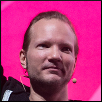
Christoph Engelbert
|
Christoph Engelbert is Senior Developer Advocate at Instana and an open source enthusiast and always interested
in "Java Next". In his spare time, he struggles with performance optimizations, the JVM internals or the garbage
collector, whereby he is also available to answer questions on these topics as a freelance consultant. He also firmly
believes in Polyglot and is familiar with Java, Kotlin, Go, TypeScript and other languages.
|
| | |
Tomitribe
|
Tomitribe is a proud supporter of Jakarta EE, MicroProfile and Open Source and built on the belief that everyone has
a role with open source and open standards. Tomitribe is dedicated to supporting both Apache TomEE, the greater
Java ecosystem and participates on a variety of specifications. We are deeply passionate about standards in Java,
know the JCP is critical to our industry and we share great responsibility to actively participate in its continued
success.
Tomitribe Position Statement (.pdf file)
|

David Blevins
|
Founder and CEO of Tomitribe. Veteran of Open Source Java EE in both implementing and defining JavaEE specifications
for nearly 20 years with a strong drive to see JavaEE simple, testable and as light as Java SE. Co-Founder of
OpenEJB (1999), Geronimo (2003), TomEE (2011). Member of the Java EE 7 and EJB 3.2 Expert Groups, past member of the
Java EE 6, EJB 3.1, and EJB 3.0 Expert Groups. Contributing author to Component-Based Software Engineering: Putting
the Pieces Together from Addison Wesley.
|
| | |
Twitter
|
Twitter relies on the JVM as the language runtime for its services. We are solving uniquely challenging problems when
it comes to designing software at our scale and do so by heavily leveraging many open-source projects; some, like
Finagle, we have created in-house and some, like OpenJDK, we have adopted, adapted, and actively contribute to. The main
goal of our JCP EC membership is to ensure that OpenJDK remains a viable, high performance, and fully-featured open
source platform.
Twitter Position Statement (.pdf file)
|

Tony Printezis
|
Tony Printezis is a Staff Software Engineer at Twitter and a member of the #TwitterVMTeam. He has 20+ years of virtual machine
and language runtime implementation experience, with special focus on memory management, and he is an OpenJDK / HotSpot group
committer and reviewer. He was one of the designers of the G1 GC and the original implementer of the CMS GC. Before Twitter,
Tony worked at Adobe, Oracle, and Sun. He holds a PhD and a BSc(Hons) in Computing Science, both from Glasgow University.
|
| | |
| 2019 EXECUTIVE COMMITTEE ASSOCIATE SEAT CANDIDATES |
Marcus Biel
|
Marcus wants to join the executive JCP committee so that he can participate in helping to formalize, standardize
and evolve Java technologies. Java is a powerful language that has grown a lot over the years. Marcus wants to
actively contribute to ensure that Java continues to meet the requirements of a modern programming language,
while still allowing us to write simple, clean code.
|

Marcus Biel
|
Marcus (@MarcusBiel) is a well known figure in the Java community, with a total of 75 000 followers across various
social media platforms. In 2019 he was named Oracle Developer Champion (Groundbreaker Ambassador). Marcus is a regular
speaker at Java conferences all over the world, such as JBCN Conf Barcelona, JPoint Moscow and JAX London. Besides this,
he works as a technical reviewer for renowned Java books such as Effective Java, Core Java SE 9 for the Impatient or
Java by Comparison.
|
| | |
CoffeeJug
|
I'm a Founder and CEO of Jappware, a software company based in Ukraine. Also, I'm a Co-Organizer of CoffeeJug
(Lviv's, west of Ukraine, meetup with a usual capacity of the members about 90) and annual conference
JavaDay Lviv. Also, Program committee member of DevoxxUA.
|
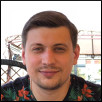
Andriy Rymar
|
Java Engineer with about 13 years on commercial experience. Public speaker, mentor and community leader. Founder
and CEO of Jappware company. Unofficial Java ambassador in Ukraine.
|
| | |
Ken Fogel
|
I am not representing an organization. rather I see myself as representing the education sector in general.
Ken Fogel Position Statement (.pdf file)
|

Ken Fogel
|
I am a professor in the Computer Science Technology program at Dawson College in Montreal. The program's mandate
is to train students, primarily right out of high school, to become job-ready software developers. In 2019 I became
Java Champion. Four years ago I began a free one-day conference in Montreal called DawsCon. I have attracted some of the
finest presenters to speak to both students and the local developer community. I have also spoken at JavaOne/CodeOne
for that past six years.
|
| | |
Werner Keil
|
Werner worked with Java since the first JDK. joined JCP 14 years ago and served 9 years as Individual EC member. A very
active participant in many JSRs from Java EE to ME. Before Oracle acquired BEA, Werner was its only external consultant
in the EMEA region. He is author of articles, books and tutorials, regular conference speaker and founder or contributor
to Open Source projects like Unit-API, JavaMoney, Eclipse Babel, UOMo, MicroProfile, OpenDDR and helps Jakarta EE in the
Spec Committee.
Werner Keil Position Statement (.pdf file)
|
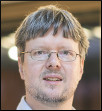
Werner Keil
|
Werner Keil is Java, Microservice and Embedded expert for a security firm. Helping Global 500 Enterprises across industries
and leading IT vendors. He worked for over 30 years as PM, Coach, SW architect and consultant for Finance, Mobile, Media,
Transport or Public sector. Werner is Eclipse, Apache Committer and JCP member in JSRs like 354 (Money), 363, JCP.next,
365 (CDI 2), 366 (Java EE 8), 375 (Security), 380 (Bean Validation 2), 385 (Units 2 also Spec Lead) and the Jakarta EE Spec
Committee.
|
| | |
Ixchel Ruiz
|
Ix-chel has a track record of helping Java developer communities across the globe. She participates often at international
events as event organizer, speaker, and mentee. Ix-chel has a keen eye for establishing relationships and links between
people, allowing them to reach new heights.
|

Ixchel Ruiz
|
Ix-chel Ruiz has developed software application & tools since 2000. Her research interests include Java, dynamic languages,
client-side technologies and testing. Java Champion, Oracle Developer Champion, hackergarten enthusiast, Open Source
advocate, public speaker and mentor.
|
| | |
Sven Ruppert
|
Why does he want to be part of the executive JCP committee? Over the last years, I got the greate chance of travelling
around the globe and joining the community as a speaker, giving workshops or just sharing knowledge. These activities
are just the first step to give a bit back what I am using over 20yrs now. After such a long time working with the outcome
of this fantastic community, it would be a pleasure for me to get the chance to work actively more involved in the future of
this ecosystem.
|

Sven Ruppert
|
Sven is working with Java since 1996 in industrial projects. He was working over 15 years as a consultant worldwide in
industries like Automotive, Space, Insurance, Banking, UN and WorldBank. During the last years before he joined
Vaadin 2017, he was Head of R&D at a reply company. Since he is Developer Advocate at Vaadin, Sven is working on
Mutation Testing of Web apps and Distributed UnitTesting besides his evergreen topic Core Java.
|
| | |
Utrecht Java User Group
|
Undoubtedly, we are experiencing a new era in the Java ecosystem with all the latest activities (e.g. Java EE moving to
Jakarta EE). If elected, Utrecht JUG will continue being active and passionate about formal JSR processes and will keep
evangelising Java and JSRs as it did this last year at several events (e.g. DWX, Oracle CodeOne, JCON, JFall,
CodeMotion, Devoxx).
Utrecht JUG Position Statement (.pdf file)
|

Thodoris Bais
|
Thodoris works as a Scrum Master at ABN Amro Bank and is the Founder & Leader of the Utrecht Java User Group
(Utrecht JUG). Thodoris serves as Expert Group member of JSR 385. He started his public speaking activities this
year by advocating JSR-385 in several conferences around the world and also helps developers to grow their career.
Thodoris is always passionate about the Java ecosystem.
|
| | |
ABOUT THE JAVA COMMUNITY PROCESS (JCP) EXECUTIVE COMMITTEE
Under the JCP 2.11 rules, the EC will be resized.
- For the 2019 annual elections, three Ratified and one Elected Seats will be eliminated, thereby reducing the EC to 21 members.
- For the 2020 annual elections, two Ratified and one Elected Seats will be eliminated, thereby reducing the EC to 18 members.
After the 2020 annual elections, there will be 11 Ratified Seats, 4 Elected Seats, 2 Associate Seats and the permanent seat
held by Oracle America. Members serve 2-year terms that are staggered so that 8 or 9 of the 17 seats are normally up for
ratification/election each year.
The EC members guide the evolution of the Java technologies. The EC
represents a cross-section of both major stakeholders and other members
of the Java Community. Duties are: select JSRs for development, approve
draft Specifications for Public Review, approve Final Specifications,
review TCK appeals, approve Maintenance revisions and possibly defer
some features to a new JSR, approve transfer of maintenance duties
between members and provide guidance to the Program Management Office
(PMO). For more information on the EC, see the Executive Committee Info
page http://jcp.org/en/participation/committee.
2018 EC Elections Results
2018 EC Special Elections Results
2017 EC Elections Results
2017 EC Special Elections Results
2016 EC Elections Results
2015 EC Elections Results
2014 EC Elections Results
2013 EC Elections Results
2012 EC Elections Results
2011 EC Elections Results
2010 EC Elections Results
2009 EC Elections Results
2008 EC Elections Results
2007 EC Elections Results
2006 EC Elections Results
2005 EC Elections Results
2004 EC Elections Results
2003 EC Elections Results
2002 EC Elections Results
2001 EC Elections Results
2000 EC Elections Results
For more information on the JCP, see the JCP Overview page.
Contact the PMO for election questions at pmo@jcp.org.
|
 |
|